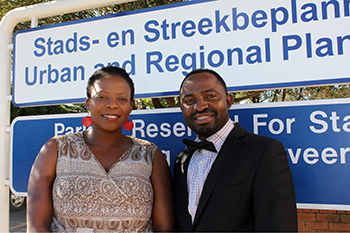Latest News Archive
Please select Category, Year, and then Month to display items
13 January 2020
|
Story Eugene Seegers
|
Photo Anja Aucamp
 Spearheading the digital expansion of the conversational Sesotho course is IDEAS Lab Director, Johann Möller (middle). With him are from the left: Prof Pule Phindane, CUT; Dr Brenton Fredericks, CUT; Bahedile Letlala, UFS Department of African Languages; and Dr Elias Malete, UFS Department of African Languages.
Spearheading the digital expansion of the conversational Sesotho course is IDEAS Lab Director, Johann Möller (middle). With him are from the left: Prof Pule Phindane, CUT; Dr Brenton Fredericks, CUT; Bahedile Letlala, UFS Department of African Languages; and Dr Elias Malete, UFS Department of African Languages.
For many years now, the UFS has been offering a one-year course in conversational Sesotho for staff members; this can then be followed up with the one-year course in advanced conversational Sesotho. The conversational Sesotho for students in the Faculty of Education was introduced in 2018 at the UFS.
The Central University of Technology (CUT) needed a conversational course for its first-year students and approached the Department of African Languages for the development of such a course. Living as we do in a multilingual country; this additional language skill opens doors and often hearts as well.
Using instructional design principles
However, the need was identified by both CUT and UFS to present this crucial information in a way that would be more appealing to digital natives as well as to those less familiar with technology. The Department of African Languages on the UFS Bloemfontein Campus, together with relevant departments from the CUT, approached the IDEAS Lab located on the UFS South Campus, since they already have a reputation for being a specialist on broadcasting and repackaging curricular content for digital presentations. The IDEAS Lab provided technical advice and built the multimedia programme, which will help the user to hear and practice phrases in Sesotho, using instructional design principles. The course will be available to both staff and students belonging to the two universities.
Room for growth
Johann Möller, Director of the IDEAS Lab, says this pilot programme will give both institutions the opportunity to test the use of multimedia for language acquisition. He adds, “Language is extremely complex, and we would like to expand this learning aid in the future.” In fact, the original design has room for growth built into it.
To keep things simple for the user and the building team, it was decided to start out with only four potential everyday scenarios where a staff member would like to speak Sesotho: Firstly, how to greet other persons from different genders; secondly, potential scenarios one might encounter in the university environment itself; thirdly, how to deal with situations at a hospital; and finally, how to use one’s language skills at a filling station.
Pronunciation is key
Each scenario contains three to four conversations that the learner can revise, along with images and audio that illustrate the situation and assist with correct pronunciation. The system does not allow the user to progress unless they have listened to the pronunciations of the sample sentences or phrases.
Further reading material and vocabulary lists are also provided, with the result that people who are using the programme can learn at their own pace. The authoring software Articulate Storyline was used to build the individual scenarios and each conversation or lesson within it. The lessons are also not dependent on an internet connection; they can be downloaded onto a flash memory drive and used offline.
Young academic receives BRICS research funding
2017-04-13

Dr Thulisile Mphambukeli and Dr Victor Okorie
from the Department of Urban and Regional Planning
at the University of the Free State.
Photo: Rulanzen Martin
“It means a lot to me, as I am a young academic embarking on my postdoctoral research project. To be able to lead a team of researchers from various research institutions in South Africa is humbling.” This is what Dr Thulisile Mphambukeli had to say on being awarded a research grant by the South African BRICS Think Tank.
The think tank, in collaboration with the National Institute for the Humanities and Social Sciences (NIHSS), awarded the lecturer in Urban and Regional Planning at the University of the Free State (UFS) R150 000. She will spearhead a research project between BRICS (Brazil, Russia, India, China, and South Africa) universities. “They have awarded me a three-month grant to facilitate a process of combining various research projects under the BRICS Academic Cluster,” Dr Mphambukeli said.
Platform provides collaboration
“The academic cluster provides a platform for researchers and academics to engage in ongoing collaboration,” she said. The grant will enable her and her research partner, Dr Victor Okorie, postdoctoral fellow in the Department of Urban and Regional Planning at the UFS, to put together a research proposal to be submitted at the end of May 2017. If successful, her team will conduct a research study across BRICS countries over a period of three years. It will be done in collaboration with various South African universities, who will form a team to collaborate with researchers from BRICS universities.
Great accomplishment for UFS
“The funds we have received are quite a great accomplishment for the UFS and our department,” Dr Okorie said. The UFS has become a force to be reckoned with when it comes to emerging issues in BRICS politics and policies. “Our project looks at the provision of ecosystems, agriculture, and security and the UFS was chosen as the host institution.”